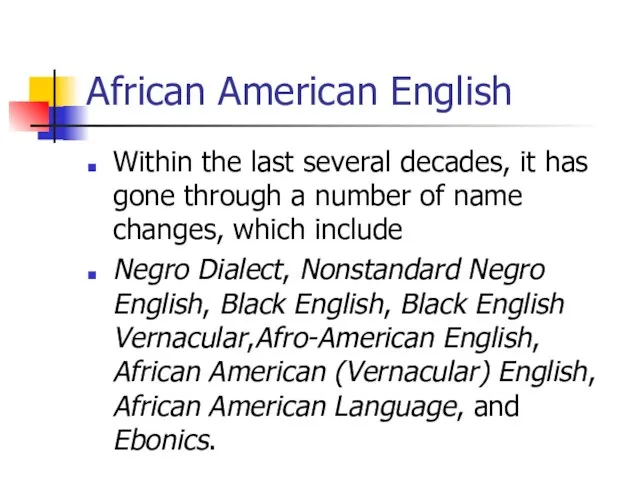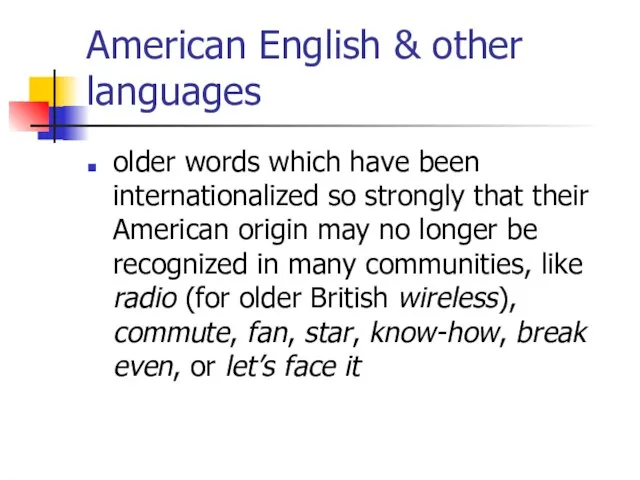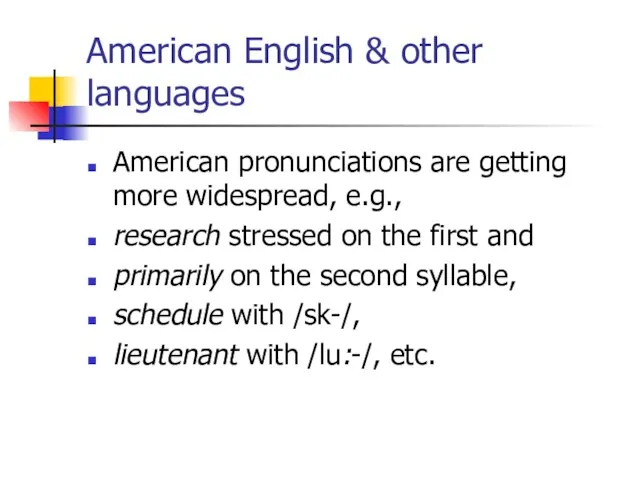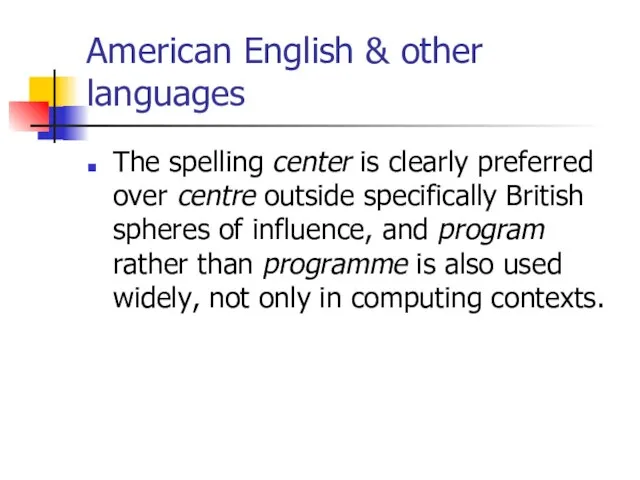Слайд 2Australian English
Divergence of Australian English from BrE can be dated back to

1788 when the first penal colony for British convicts was set up. They spoke mostly Cockney. In 1827 when the speech of Australian residents was described, strong Cockney impact was noticed.
Слайд 3Australian English
During Australian gold rushes in the 1850s Australian English borrowed increasingly

from external sources.
Americanization of Australian English occurred during massive influx of American troops during WWII and increased later in the 1950s due to television, movies and mass media.
Слайд 4Australian English
Australian English has a lot in common with New Zealand English,

however the difference is obvious to a speaker from either country.
Australian Corpus of English
Слайд 5Australian English
British spelling prevails, correlation of British and American spelling in 3:1

( -ise VS ize)
There is some influence of Hiberno- English as many people are of Irish descent. Irish impact is seen in the use of me instead of my: What’s me hat?
Слайд 6Australian English
Some words in Australian English are unique like
bush – remote,

sparsely-populated areas.
Some elements from Aboriginal languages (places, flora, fauna) were incorporated like kangaroo.
Слайд 7Australian English.
Regional Vocabulary
Pork products are known
in South Australia as fritz
In

Victoria as stras
In New South Wales as devon,
In Western Australia as polony
In Queensland as windsor
In Tasmania as belgium
Слайд 8Australian English. Intonation
Stereotypically Australians have a rising tone/ questioning intonation known as

high rising terminal.
There are lots of regional patterns
Слайд 9Australian English as a sociolinguistic phenomenon
Broad Australian English
General Australian English
Cultivated Australian English

Слайд 10Australian English
Cultivated Australian English (CAE) is similar to RP. 3 -10 %

population speak CAE. Common among public figures.
People speaking CAE are ridiculed as aloof, snobby, affected.
Слайд 11Australian English
General Australian English - stereotype of Australian English, the language of

movies & TV.
Broad Australian English is a recognizable variety due to accent, known for long diphthongs and nasal drawl.
Слайд 12Australian English
Diminutives which end in –ie or – o:
Abo – aborigine
Arvo –

afternoon
Doco – documentary
Servo - service station/ petrol station
Bottle- o - liquor store
Rego /dz/ - vehicle registration
Слайд 13Australian English
Diminutives which end in –ie or – o:
Compo – compensation
Leso/ lesbo

- lesbian
Ambo – ambulance
Filo – Filipino Americans
Слайд 14Australian English
Diminutives which end in –ie or – o:
Barbie – barbecue
Bikkie –

biscuit
Bikie - bycycle
Brekkie - breakfast
Brickie – brick layer
Mozzie - mosquito
Слайд 15Australian English
Humour
Inherited from Britain and Ireland is deadpan humour when a

person makes extravagant, outrageous or ridiculous statements in a neutral tone, indicating it is humour. Tourists might be told jokes about kangaroos hopping across the Sydney Harbour Bridge.
Слайд 16Australian English
Due to caricaturised over-use some Australian phrases dropped out of use.

Слайд 17“Wogspeak”
The term “wog” was originally a derogatory term for migrants to Australia

from non-Anglo-Celtic countries (particularly Southern and Eastern Europe).
It has in recent years been refigured as a term used by those groups for themselves, and for them marks the solidarity in their common experiences of migration under less than ideal circumstances.
Слайд 18“Wogspeak”
The variety referred to as “wogspeak,” is also referred to as “New

Australian English” (NAusE).
It is thus clearly as much a social and ideological construct as a linguistic one.
Слайд 19New Zealand English
NewZild = New Zealand English
NZ= New Zealand

Слайд 20New Zealand English
Influence of Australian English, of Maori speech.
Some traits of old

dialects of low-class English of the 19th c. survived in NewZild
Wellington Corpus of New Zealand English
Слайд 21NewZild
Major difference with Australian English is flattened /i/:
pan →pen, pen →

pin, pin →pun.
Bull /buwd/ , milk /muwk/
Слайд 22NewZild
British spelling is found universally in New Zealand
-ise is used exclusively
But

American spelling creeps: through →thru
Слайд 23NewZild
Maori impact
in flora & fauna ( kiwi - a bird, a

NZ-er )
Community consultation
Health, education
government
Слайд 24NewZild
Maori impact
Kia ora = be healthy/ hello, greeting
Haere ra = goodbye
Kia

kaha - be strong/ moral support
Makariri nē? = cold isn’t it?/ greeting in the morning
Слайд 25NewZild
Maori impact
Nē – isn’t it?
Half-pai (pai – means good) = half

standard
Слайд 26NewZild vocabulary
Super – old age pension scheme
Sweet as - fine with me

Choice! = excellent idea
Cuzzie bro – close friend
Flatting = sharing a flat
Flash – stylish, expensive
Fulla – guy, taken from fella, fellow
Слайд 27NewZild
Hard case- a person with a good sense of humour
Scarfie – a

university student
Bring a plate = ads of self catering
Box of Birds, Box of Bees – feel very good
Having you on = pull sb’s leg
Слайд 28Indian English
British English and Scottish English are taught, the latter influenced Indian

English with rhoticity and thrilled -r-.
RP is encouraged and promoted
Indian English has established itself as an audible distinct dialect with specific phrases
Слайд 29Indian English
Obsolete forms of English, antiquated phrases which were fashionable 50 years

ago
Indian English is an object of jokes due to ruined Grammar
Слайд 30Indian English
BrE is popular with older generations, AmE – with younger, there

are debates about variant to be adopted:
70% BBC English,
10% General American English,
17% Indian English
Слайд 31Indian English
AmE grows popular due to TV, pop-culture, visits to the USA
AmE

dominates within academic, technical publications, mass media
Слайд 32Indian English
/v/ < > /W/
Impact of Bengali, Hindi, Tamil → Benglish, Hindish,

Tanglish
Слайд 33Indian English. Grammar
Progressive tense in stative verbs :
I’m understanding, He is

knowing the answer
Variation in number: he likes to pull your legs
Prepositions – to pay your attention on, discuss about
Слайд 34Indian English. Grammar
Tag questions: isn’t it ? / no? in general questions;

He’s here, no?
Word order: They’re late always. My all friends are waiting. Yes, I didn’t.
Past tense form: I had gone = I went
Слайд 35Indian English. Grammar
But & only as intensifiers: I was just joking but.
Open/

close = turn on/off
Overuse of words actually, basically, obviously in the beginning of the sentence
Слайд 36Indian English. Grammar
Overuse of the word different: We had gone to different

different places.
Omission of the article: Let’s to ______city
Слайд 37Indian English. Vocabulary
Your good name please? = what’s your name?
Deadly = intensive

( That movie is deadly)
Hi-fi = stylish (Your shoes are hi-fi)
Sexy = excellent & extremely cool (That’s a sexy car)
Слайд 38Indian English. Vocabulary
Hello! What do you want? = in telephone conversations
Back =

ago : I met him 5 years back
Mr/ Mrs as common nouns: My Mrs is not feeling well
Uncle/ aunt to refer to someone significantly older
Слайд 39Indian English. Vocabulary
Repair = of a broken object: The TV became repair
Healthy

= to refer to fat people
Dress - to refer to any clothes for men/ women/ children
Bath and bathe are interchangeable
Слайд 40Indian English. Vocabulary
Interjections
High-end-= of very high quality (sarcastically of work and people)
Oof!

= distress & frustration
arey! Acchha! = to express range of emotions
Слайд 41Indian English
Words from India in English
Jungle, bungalow, banana, pajamas, guru, shampoo

Слайд 42Canadian English
traditionally described as a mix of British and American features,
with

the balance between the two varying by region, by generation (an ongoing Americanization has been observed among the young),
pronunciation base is strongly American,
the British component is more clearly visible in some vocabulary items
Слайд 43Canadian English
Many words known as americanisms are also found in Canada

Слайд 44Canadian English
Newfounland
Eastern Canadian
Quebec
Central / Western
Ottawa Valley Twang

Слайд 45Canadian English/ Newfounland
Elements from European Languages of 15-17th centuries non-existent in

Europe. Spanish, French, Irish, English
Spoken very quickly, not intelligible for non-local people
Слайд 46Canadian English/ Eastern
Close to Am E, considered as Canadian English in the

USA
Слайд 47Canadian English/ Quebec
Strong French accent,
Throaty sounds

Слайд 48Canadian English/ western
60% population
close to northern US accents

Слайд 49Canadian English/ Ottawa
1.3 million people
Impact of Scottish and French, Irish

Слайд 50American English
Northern is not to be confused with political North during the

Civil war, historically it is New England
Southern – coastal areas of Waryland, Virginia, Georgia, Gulf States
Midland – area extending through all the country
Слайд 51American English
The Dictionary of American Regional English in 1907
Linguistic atlas of AmE

in 1931
1200 people interviewed, 1000 points of usage
Слайд 52American English
The Dictionary of American Regional English in 1985-1991
The data from 2700

informants in 1002 communities in 50 states collected between 1965-1970
Слайд 53Some British–American vocabulary differences
UK US UK US
lift elevator pavement sidewalk
boot trunk waistcoat

vest
Leader editorial vest undershirt
bowler (hat) derby handbag purse
beetroot beets
head teacher principal
banknote bill
aubergine eggplant
Слайд 54Some British–American vocabulary differences
biscuit cookie
queue line
flat apartment
fancy-dress party costume party
pensioner

retiree
lorry truck
football soccer
trousers pants
crisps potato chips
Слайд 55British and American automobile vocabulary
British American
windscreen windshield
bonnet hood
wing fender
quarterlight wing
boot trunk
indicator turn

signal
hazard lights flashers
running lights parking lights
Tyre tire
Слайд 56American coinages
Among the countless American coinages are these:
radio, disc jockey, waterfront,

right away, get along with, fall for, make the grade, get around to, babysitter, boyfriend and girlfriend, knowhow, in the red, hitchhike, show business, merger, publicity, executive, hindsight, commuter etc.
Слайд 57British VS American English
1. Sing/ Plural coordination
BrE The team is

…/AmE The team are
2. Past Simple in AmE with words already, just, yet
3. Get –passive is more common in AmE
Слайд 58British VS American English
4. Subjunctive mood is more common in AmE
BrE He

suggested they should apply…
AmE He suggested they_____ apply..
5. Irregular verbs in AmE form past tense forms as regular verbs ( learned, leaped, spelled)
Слайд 59BrE VS AmE: grammar
AmEng: I suggest that Susie take the job.
BrEng:

I suggest that Susie takes the job.
AmEng: The report recommends that he be promoted.
BrEng: The report recommends that he is promoted.
Слайд 60BrE VS AmE: grammar
AmEng: I suggested that Susie take the job.
BrEng: I

suggested that Susie took the job.
AmEng: The report recommended that he be promoted.
BrEng: The report recommended that he was promoted.
Слайд 61British VS American English
6. Usage of prepositions: AmE to meet with someone

Monday to Friday , AmE Moday thru Friday
In Churchill Street, AmE on Churchill Street
7. BrE towards, backwards AmE toward__
Слайд 62Modern English Grammar: Vision & Terminology
Corpus Linguistics contribution.
Cambridge International Corpus (CIC)

Слайд 63North American English Grammar
Written grammar displays fewer differences between BrE and

AmE than spoken grammar.
American influence on everyday English grammar is considerable, for example, like as a marker of direct speech reporting.
Слайд 64Shall
Shall is infrequent in AmE, they prefer will or be going to.

I shall be in the office at 9.30.
Frequency of shall per 1 million words
BrE AmE
118 16
Слайд 65Shall
However, AmE allows shall in first person interrogatives, especially functioning as suggestions

or in semi-fixed expressions:
Let’s try to find other words, shall we?
How shall we say it?
Слайд 66must
Must is much more frequent in BrE than in AmE which prefers

have to to express obligation.
Frequency of Must per 1 million words
BrE AmE
450 151
Слайд 67have got to
Modal have got to is twice more frequent in spoken

BrE than AmE.
Have to (without got) is twice more frequent in AmE.
I’ve got to go and meet my mother at the station.
Слайд 68 Had better
Had better is 6 times more frequent in

spoken BrE than AmE.
Слайд 69Be going to
Be going to ( and the contracted form gonna)

are not a characteristic use in BrE, which prefers imperatives in direction-giving:
You’re gonna to go two blocks and then you’re gonna to see a big modern white building… (AmE)
Come to T-junction, turn left. Go down…, you come …. (BrE)
Слайд 70guess
I guess is 30 times more frequent in spoken AmE than in

BrE where
I suppose, I reckon are more frequent.
I reckon we should have more coffee after this .
Слайд 71Be & Not
Negated forms are found in both variants, though in

AmE stronger preference is observed for not in both present and past tense forms:
Tim isn’t working there any more. (BrE)
Joe is not working there any more. (AmE)
Слайд 72Have got
The present tense form of have with got is more than

twice frequent in spoken BrE than AmE:
I’ve got one sister and one brother (BrE)
Слайд 73Get
In AmE, get has an –ed participle form gotten, which is

not used in BrE:
I mean, as poverty has gotten worse, you know, education has gotten worse…
Слайд 74Ir(regular) verbs
In AmE, the past tense of fit is most often fit,

while in BrE fitted:
Jennifer says she never really fit in…
I found a pair of boots that fitted me
Слайд 75Ir(regular) verbs
Verbs such as burn, dream, lean, learn, smell, spell, spill often

allow a past tense and –ed ending. AmE overwhelmingly prefers –ed ending.
Слайд 76Interrogative tags
Interrogative tags are around 4 times more frequent in BrE than

in AmE:
He’s brilliant, isn’t he?
Слайд 77copy tags
In informal contexts, AmE speakers often use an interrogative copy tag

with rising intonation in responses involving surprise or emotional involvement:
I changed schools three times
You did?
In one year.
Wow. Wow.
In BrE Did you?
Слайд 78copy tags
Affirmative copy tags occur in both variants but are much rarer

in AmE than in BrE:
I think it’s really funny that they live together, I do. (BrE)
Слайд 79right?
The universal tag,right? is 4 times more frequent in AmE than in

BrE:
You lived in Canada, right? (AmE)
I was hoping we could change this one, right? (BrE)
Слайд 80Tails
Tails are considerably less common in AmE than in BrE, but they

do occur in informal spoken AmE:
That was a nightmare, that one. (BrE)
He’s a scary guy, that Dan Boland (AmE)
Слайд 81Really → real
In informal spoken AmE, really is ofen used as a

modifier of adjectives and other adverbs without the –ly ending. This is sometimes considered non-standard by traditionalists:
We all get along real well.
They were real nice to us.
Слайд 82Well, good
Good is often used in informal spoken AmE where BrE requires

well:
Hi, how are you doing?
I’m good.
Слайд 83Present Perfect
Present Perfect is less frequent in AmE where the tendency is

to use Past Simple.
Слайд 84exclamative
AmE uses some exclamative and intensifying expressions which are not common in

BrE: geez, goddam, oh my gosh:
It was the best tasting goddam stuff I’ve ever eaten in my life.
It’s been eighty degrees here.- Oh my gosh!
Слайд 85African American English
Within the last several decades, it has gone through

a number of name changes, which include
Negro Dialect, Nonstandard Negro English, Black English, Black English Vernacular,Afro-American English, African American (Vernacular) English, African American Language, and Ebonics.
Слайд 86American English & other languages
Words which seem to be spreading widely and

rapidly include gas, guy(s), Hi, movie, truck, Santa (Claus), and station wagon, and adolescent slang and fashion terms like man as a form of address or cool meaning ‘very good’.
Слайд 87American English & other languages
older words which have been internationalized so strongly

that their American origin may no longer be recognized in many communities, like radio (for older British wireless), commute, fan, star, know-how, break even, or let’s face it
Слайд 88American English & other languages
American pronunciations are getting more widespread, e.g.,
research

stressed on the first and
primarily on the second syllable,
schedule with /sk-/,
lieutenant with /lu:-/, etc.
Слайд 89American English & other languages
The spelling center is clearly preferred over centre

outside specifically British spheres of influence, and program rather than programme is also used widely, not only in computing contexts.
























































































 Виды писем. Порядок отправления писем различных видов
Виды писем. Порядок отправления писем различных видов Человек, как личность
Человек, как личность Для чого ми вивчаємо природознавство
Для чого ми вивчаємо природознавство Основы религиозных культур и светской этики
Основы религиозных культур и светской этики Roald Dahl (1916-1990)
Roald Dahl (1916-1990) Информация для родителей по формированию бюджета школы
Информация для родителей по формированию бюджета школы Русский школьный театр при Алексее Михайловиче
Русский школьный театр при Алексее Михайловиче Интернет как интеллектуальная среда для поддержки исследований и обучения
Интернет как интеллектуальная среда для поддержки исследований и обучения Ботаника-наука о растениях
Ботаника-наука о растениях Подростки и косметика
Подростки и косметика Устный счет до десяти
Устный счет до десяти Подготовка и организация приема граждан в 1 класс
Подготовка и организация приема граждан в 1 класс Земноводные - амфибии
Земноводные - амфибии РАНХиГС. Приемная кампания
РАНХиГС. Приемная кампания Презентация докладаруководителя ЭКЦ «Инвест-Проект»Лумпова Андрея Ивановичана Event-конференции 22 октября 2007 года«О принципах ц
Презентация докладаруководителя ЭКЦ «Инвест-Проект»Лумпова Андрея Ивановичана Event-конференции 22 октября 2007 года«О принципах ц Обобщение опыта работы учителя физической культуры муниципального бюджетного общеобразовательного учреждения
Обобщение опыта работы учителя физической культуры муниципального бюджетного общеобразовательного учреждения I love you
I love you Обособленные определения
Обособленные определения Тайна бумажного листа
Тайна бумажного листа Презентация на тему Национальная экономика
Презентация на тему Национальная экономика Славный город мой Асбест
Славный город мой Асбест Геральдическая латынь
Геральдическая латынь Бинарный урок технология +ИЗО.
Бинарный урок технология +ИЗО. «Человек и профессиональный успех»
«Человек и профессиональный успех» Обеспечение высокого качества организации образовательного процесса на основе эффективного использования современных образова
Обеспечение высокого качества организации образовательного процесса на основе эффективного использования современных образова Презентация на тему Автопортреты Альбрехта Дюрера
Презентация на тему Автопортреты Альбрехта Дюрера  яблоки от 0 до 10
яблоки от 0 до 10 Презентация на тему РУАНДА
Презентация на тему РУАНДА